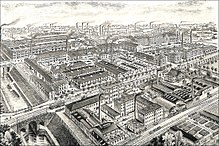Rudolph Sack
Christian Rudolph Sack (* 7. December 1824 in Kleinschkorlopp ; † 24. June 1900 in Leipzig ) was a German mechanical engineering - entrepreneurs .
Life
Sack was the son of a farmer . His father died when Rudolph was four years old, so he had to work on the family farm from an early age. He learned drawing and the basics of mathematics from a surveyor in Leipzig. In 1842 he left his parents' farm and worked as a manager of various estates in the province of Saxony . After the death of his stepfather in 1855, he took over his parents' farm and in 1857 married the miller's daughter Adolphine Franke (1832-1896), with whom he had two sons and two daughters.
During his agricultural activity he became aware that the use of machine technology in agriculture was far behind in comparison to other branches of the economy. Although the manufacturer Schwarz first built metal devices in the 1820s, the majority of such devices were still made of wood. 1850 built bag in Löben assisted by the Dorfschmied the first German plow from iron or steel . From 1854 he made plows to order. In 1857 he exported 120 plows to Kiev , later another 80. The client, a count, recommended Sack to relocate his production to industrially highly developed Great Britain. There Sack had his plows manufactured by Garetts & Sons in Leiston , a small town 140 km northeast of London .
In early May 1863, on the recommendation of the Leipzig lawyer and entrepreneur Karl Heine (1819–1888), he founded the Rudolph Sack agricultural machinery factory in Leipzig-Plagwitz , which developed into one of the most important companies in this branch. More than two million pieces of his universal plow were sold; the annual production in 1910 was around 182,000 pieces.
After Rudolph Sack retired from the management in 1891, his son Paul (1863–1923) took over the company.
Honors
Soon after Rudolph Sack's death, the Quaistraße along the Karl-Heine Canal and his business in Leipzig- Lindenau were named after him. After 1946 this went on in the company premises.
On December 6, 2000, Fröbelstrasse in Leipzig- Plagwitz was renamed Rudolph-Sack-Strasse.
See also
literature
- Rudolf Hundhausen: Rudolf Sack factory for agricultural equipment, ... In: The German Industry (1888-1913), Berlin 1913 pp. X121-X123.
- Giesela Buchheim, Wolf D. Hartmann: Biographies of important entrepreneurs. People and knowledge, Berlin 1991, ISBN 3-06-062251-5 .
- Klaus Dreyer: The history of BBG. From Rudolph Sack to Amazone. The checkered history of a traditional East German brand. DLG-Verlag, Frankfurt am Main 2009, ISBN 978-3-7690-0750-3 .
- Eckart Roloff : He was there early when it came to modern agricultural technology. With a lot of inventive talent and foresight, Rudolph Sack from Saxony developed a model factory and research institute from a small plow business. In: Landwirtschaftliche Zeitschrift Rheinland ISSN 0724-5580 , edition 27/2010, page 42 f.
- Otto Sack: The Chronicle of the House of Rud. Sack Leipzig - 1863–1938, published for the 75th anniversary , Leipzig 1938
- Otto Sack and Hans Sack: Rudolf Sack, his life and his work. Ed. By Rud. Sack Maschinenfabrik, Leipzig-Plagwitz 1925–1926, 72 pages.
Web links
- Sack, Rudolph. In: Leipzig biography. Retrieved February 5, 2017 .
- Sack, Rudolph. In: Leipzig Lexicon. Retrieved February 5, 2017 .
Individual evidence
- ^ First name Christian: See http://d-nb.info/gnd/134074807 - accessed on August 10, 2019
- ↑ http://d-nb.info/361662602 - accessed on August 10, 2019
- ↑ http://d-nb.info/361662629 - accessed on August 10, 2019
| personal data | |
|---|---|
| SURNAME | Sack, Rudolph |
| ALTERNATIVE NAMES | Sack, Christian Rudolph |
| BRIEF DESCRIPTION | German mechanical engineering entrepreneur |
| DATE OF BIRTH | December 7, 1824 |
| PLACE OF BIRTH | Kleinschkorlopp (today to Kitzen ) |
| DATE OF DEATH | June 24, 1900 |
| Place of death | Leipzig |


